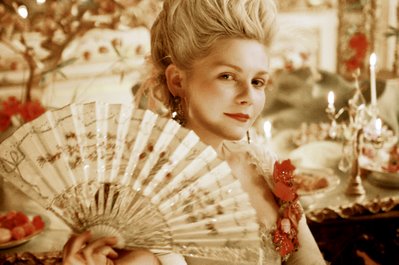
Kirsten Dunst as Marie-Antoinette in Marie Antoinette
Directed by Sofia Coppola,
USA Photo Credit: Columbia Pictures
Directed by Sofia Coppola,
USA Photo Credit: Columbia Pictures
Marie Antoinette is a brilliant film.
Yet it seems to be a real mess. It seems to make no sense that -- among other things --
- Kirsten Dunst plays M. A. at fourteen, since Kirsten does not (can not and never again will) resemble a 14 year old (the age at which M. A. came to France);
- there is a hodgepodge of languages and accents (including just enough French to remind you that this can't be a real portrayal of things as they were);
- politics (which we know was of life and death importance) is mostly ignored (though gossip is not) -- except as seen through the letters and visits of her mother, brother, and countrymen;
- and sex is treated bizarrely.
The question is, What holds the movie together? What is the spine of the film that enables the movie to work despite these strangely unreal and unpromising elements? (The spine -- ie backbone -- is the term used for the idea that a director uses to build a single consistent vision to hold a film or play together.)
The fact that we see how tedious and artificial the life at Versailles must have been, has been siezed on by some as the point of the film. I don't find that a satisfying answer at all; but I take it for a clue.
The director, Sofia Coppola has said she is concentrating on the internal life of M. A. and that is a clue. At face value, given the the usual meaning of a phrase like that, I don't find it a satisfying answer on its own. But, I think, understanding what she really means by M. A.'s internal life, makes everything make sense.
The movie should be taken as if it were built from M. A.'s diary. It is the world of Versailles as she would see it.
The reason the film uses all those confusing accents is because, to M. A., coming from Austria, the cacaphony of all kinds of French people speaking all kinds of French would sound like that. It's a multitude of sounds, some of which are understandable; some of which is just noise; and she hears just enough incomprehensible French to remind her that she is not getting it.
The reason that Kirsten, rather than a young actress, is playing the 14 year old M. A. is that no 14 year old girl coming to a foreign court to get married would feel like a child. To herself, she is a young woman come to represent her country to a foreign place. To herself, she is a woman.
Politics is not of great interest to her -- though we know it should be -- so it barely appears in the film.
The reason the treatment of her sexual relationship with her husband is so strange is that to her, she would seem natural, and her husband would just seem like a geek, one with whom she is trying to establish a relationship. This is her view. We, the audience, would view this relation quite differently if the script were written from our judgemental point of view. But it is not. This is her script of what happened.
And, finally, the gloriously luxuriant, incredibly ponderous, ridiculously mannered life at Versailles, and her general alienation as a stranger in a strange land is the center of her existence and her comprehension of the court. So they are properly at the center of the movie. But that is not the whole point of the movie. It is just part of the many consistent elements representing the world of Marie Antoinette as she would have understood it.







No comments:
Post a Comment